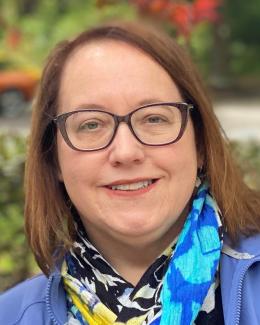Bryan Piatkowski, a Liane Russell Distinguished Fellow in the Biosciences Division at Oak Ridge National Laboratory, is exploring the genetic pathways for traits such as stress tolerance in several plant species important for carbon sequestration or the sustainable production of biofuels. His research could make it easier to engineer those traits in plants and accelerate the transfer of those abilities to quickly develop hardy plants to combat climate change.
“I’m working to build a framework that can be used to extend what we know about the gene regulatory networks of well-studied species like Arabidopsis and Populus to others that might be emerging species of interest,” Piatkowski said. “What components of those networks are shared across plant lineages, for instance?”
A second area of his fellowship work as an evolutionary biologist and computational scientist is focused on how microbes influence the expression of those genes. “Here, we want to explore how microbes may be helping plants deal with heat stress, specifically looking at host gene expression with and without certain bacteria to determine whether the microbes are triggering a reprogramming of those stress response networks,” he said.
The third leg of his fellowship involves studying adaptation in populations of Sphagnum moss along a latitudinal gradient from Florida to Newfoundland. So far, he said it appears that plant lineages in northern climates are more similar to each other than they are to their southern cousins, and the genomic changes differentiating these lineages may reflect adaption to temperature extremes.
While he is initially studying heat tolerance in plants, Piatkowski said the same comparative approach could be used to study other traits, including how plants cope with nitrogen limitation or how their cell walls are constructed. “By developing this framework, we can extend certain genetic discoveries in model systems to different species, especially to plants that might become of interest in the future.”
A thousand questions
Piatkowski comes by his scientific curiosity naturally. His parents, both aerospace engineers, helped to foster his deep curiosity about the natural world from a young age, guiding his persistent questions about the diversity of life around him. He later pursued a career in the biological sciences, after taking influential biology and environmental science classes in high school.
At Roanoke College, a small liberal arts school in the Blue Ridge Mountains, he began hands-on laboratory research as a freshman with guidance from key mentors who further encouraged his work. He went on to earn a master’s degree in plant biology at Southern Illinois University, and a doctorate in biology at Duke University.
He first became acquainted with ORNL while working on his thesis at Duke, analyzing the ecology and evolution of Sphagnum peat mosses — a group of keystone species in carbon-rich peatlands. He collaborated with ORNL scientists who were sequencing the Sphagnum moss genome to better understand its role in carbon and nitrogen cycling.
The diversity of expertise at ORNL was attractive to Piatkowski. “We have experts in plant physiology, in bacterial genetics, in computational biology, and so much more. We need collaboration from those different disciplines to address some of the big science questions we face today.”
“We’re going to be facing enormous challenges as we move forward with the changing climate, with the possibility of more frequent droughts and extreme weather events that will impact our ability to grow crops for food and bioenergy,” he said. “What drives me forward is trying to figure out how a better understanding of the natural world can be applied to help us tackle these issues.”
Away from the lab, Piatkowski enjoys hiking in Frozen Head State Park, as well as kayaking the Tennessee River. He is also an avid guitarist, and even considered music as a career at after playing in a jazz band and classical guitar ensemble in high school. He still plays and records music in his spare time.
Piatkowski urges young people to become involved in the climate challenge through a career in science. “Explore all the fields you might be interested in, find something you love doing every day, and don’t be afraid to ask questions,” he said. “Challenging the status quo is an important part of how scientific progress is made.”
UT-Battelle manages ORNL for the Department of Energy’s Office of Science, the single largest supporter of basic research in the physical sciences in the United States. The Office of Science is working to address some of the most pressing challenges of our time. For more information, please visit energy.gov/science.






